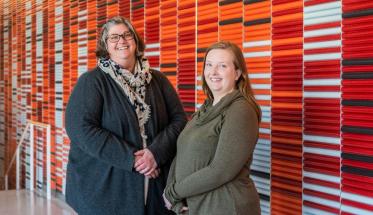Even as the number of WPI students with disabilities has increased in recent years, the staff in the Office of Accessibility Services (OAS) has remained steadfast in its commitment to ensuring that students have access to the support they need on campus.
The OAS currently works with 784 undergraduate and graduate students—in a student body of more than 7,200—with documented disabilities who need some type of accommodation in classes, in residence halls, or around campus. A small portion of those students at any given time (right now about 1 percent) are receiving only a temporary accommodation because of an injury or illness. The ongoing rise in long-term accommodations at WPI mirrors national trends showing greater numbers of students receiving diagnoses in elementary and secondary schools.
“More students are reaching out for a diagnosis earlier in life, and once they have an accommodation in place in high school, they want it to migrate with them to college,” says Amy Curran, director of accessibility services. “I think it’s a good thing and suggests that more people are in tune with their needs.”
In order to receive an accommodation of any sort, including temporary assistance following an injury or illness, students must have their disability officially documented by a medical professional. Disabilities might be neurological, emotional, physical, or any combination thereof. Curran says that the most common disabilities among WPI students are attention deficit/hyperactivity disorder (ADHD) and autism.
But there’s never a one-size-fits-all accommodation. Even students with the same diagnosis may need vastly different academic supports. The exact accommodation depends on the specifics of the student’s diagnosis and what their doctor determines will best help them succeed.
For example, many students with ADHD receive extended time on exams and quizzes to help with focus and processing speed, but the amount of time can vary depending on the student. Some students with ADHD are also able to take their exams in WPI’s Exam Proctoring Center, which provides an environment with fewer distractions than a traditional classroom.
Educating faculty members about what each student needs is a big part of what Curran and her colleagues in the OAS do.
“We have a very open relationship with faculty members and work closely with students to navigate specific situations,” notes Taylor Rohena, assistant director of accessibility services. “If a professor calls us and asks about accommodations for a student, we can suggest ways that we know, from our experience, that a particular student could learn better. Or we could share something about that student’s communication style. But we never share any diagnosis or documentation.”
OAS staff also work directly with students on self-advocacy. In fact, based on the Americans with Disabilities Act (ADA), in college it is the student—not the parent/guardian or instructor—who is responsible for making sure they get the support services they need.



